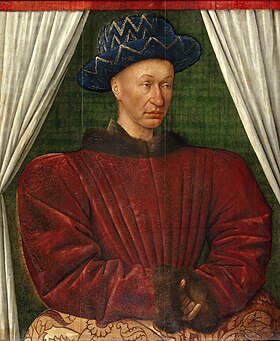
Dauphin of France, originally Dauphin of Viennois, was the title given to the heir apparent to the throne of France from 1350 to 1791, and from 1824 to 1830. The word dauphin is French for dolphin and was the hereditary title of the ruler of the Dauphiné of Viennois. While early heirs were granted these lands to rule, eventually only the title was granted.
A reign is the period of a person's or dynasty's occupation of the office of monarch of a nation, of a people or of a spiritual community. In most hereditary monarchies and some elective monarchies there have been no limits on the duration of a sovereign's reign or incumbency, nor is there a term of office. Thus, a reign usually lasts until the monarch dies, unless the monarchy itself is abolished or the monarch abdicates or is deposed.
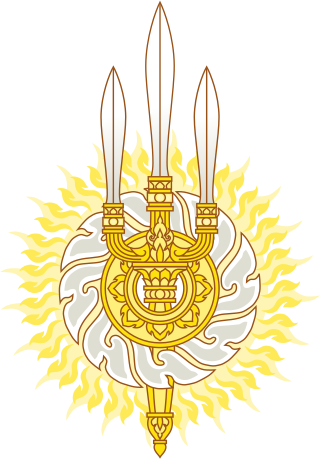
The Chakri dynasty is the current reigning dynasty of the Kingdom of Thailand. The head of the house is the king, who is head of state. The family has ruled Thailand since the founding of the Rattanakosin Era and the city of Bangkok in 1782; following the end of Taksin Thonburi's reign, when the capital of Siam shifted to Bangkok. The royal house was founded by Rama I, an Ayutthaya military leader of Sino-Mon descent.
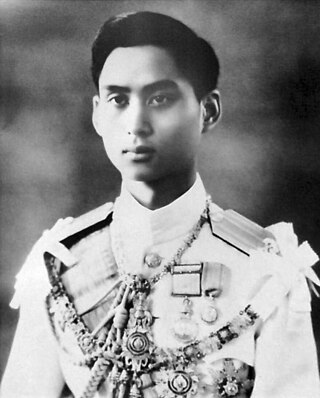
Ananda Mahidol was the eighth King of Siam from the Chakri dynasty, titled Rama VIII. At the time he was recognised as king by the National Assembly in March 1935, he was a nine-year-old boy living in Switzerland. He returned to Thailand in December 1945, but six months later, in June 1946, he was found shot dead in his bed. Although at first thought to have been an accident, his death was ruled a murder by medical examiners, and three royal aides were later executed following very irregular trials. The mysterious circumstances surrounding his death have been the subject of much controversy.

Bhumibol Adulyadej, conferred with the title King Bhumibol the Great, was the ninth King of Thailand from the Chakri dynasty, titled Rama IX. Reigning from 1946 until his death in 2016, he is the third-longest verified reigning sovereign monarch in world history after King Louis XIV and Queen Elizabeth II, reigning for 70 years and 126 days. His reign of over 70 years is the longest reign of any Thai monarch, and the longest native rule of any Asian sovereign.

A coronation is the act of placement or bestowal of a crown upon a monarch's head. The term also generally refers not only to the physical crowning but to the ceremony wherein the act of crowning occurs, along with the presentation of other items of regalia, marking the formal investiture of a monarch with regal power. Aside from the crowning, a coronation ceremony may comprise many other rituals such as the taking of special vows by the monarch, the investing and presentation of regalia to the monarch, and acts of homage by the new ruler's subjects and the performance of other ritual deeds of special significance to the particular nation. In certain Christian denominations, such as Lutheranism and Anglicanism, coronation is a rite. As such, Western-style coronations have often included anointing the monarch with holy oil, or chrism as it is often called; the anointing ritual's religious significance follows examples found in the Bible. The monarch's consort may also be crowned, either simultaneously with the monarch or as a separate event.
An heir presumptive is the person entitled to inherit a throne, peerage, or other hereditary honour, but whose position can be displaced by the birth of a person with a better claim to the position in question. This is in contrast to an heir apparent, whose claim on the position cannot be displaced in this manner.
A golden jubilee marks a 50th anniversary. It variously is applied to people, events, and nations.
An elective monarchy is a monarchy ruled by a monarch who is elected, in contrast to a hereditary monarchy in which the office is automatically passed down as a family inheritance. The manner of election, the nature of candidate qualifications, and the electors vary from case to case. Historically, it was common for elective monarchies to transform into hereditary ones over time or for hereditary ones to acquire at least occasional elective aspects.
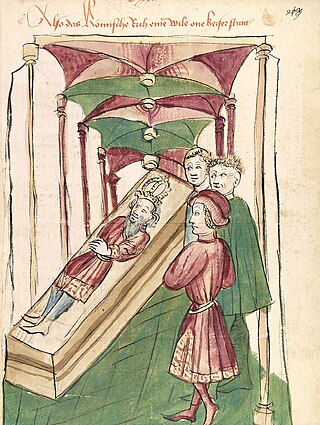
An interregnum is a period of discontinuity or "gap" in a government, organization, or social order. Archetypally, it was the period of time between the reign of one monarch and the next, and the concepts of interregnum and regency therefore overlap. Historically, longer and heavier interregna have been typically accompanied by widespread unrest, civil and succession wars between warlords, and power vacuums filled by foreign invasions or the emergence of a new power. A failed state is usually in interregnum.

In the United Kingdom, the Accession Council is a ceremonial body which assembles in St James's Palace in London upon the death of a monarch to make formal proclamation of the accession of the successor to the throne. Under the terms of the Act of Settlement 1701, a new monarch succeeds automatically. The proclamation confirms by name the identity of the new monarch, expresses loyalty to the "lawful and rightful Liege Lord", and formally announces the new monarch's regnal name, while the monarch and others, in front of the council, sign and seal several documents concerning the accession. An Accession Council has confirmed every English monarch since James I in 1603.

Succession to the British throne is determined by descent, sex, legitimacy, and religion. Under common law, the Crown is inherited by a sovereign's children or by a childless sovereign's nearest collateral line. The Bill of Rights 1689 and the Act of Settlement 1701 restrict succession to the throne to the legitimate Protestant descendants of Sophia of Hanover who are in "communion with the Church of England". Spouses of Catholics were disqualified from 1689 until the law was amended in 2015. Protestant descendants of those excluded for being Roman Catholics are eligible.

Demise of the Crown is the legal term in the United Kingdom and the Commonwealth realms for the transfer of the Crown upon the death or abdication of the monarch. The Crown transfers automatically to the monarch's heir. The concept evolved in the kingdom of England, and was continued in Great Britain and then the United Kingdom. The concept also became part of the constitutions of the British colonies, and was continued in the constitutions of the Commonwealth realms, until modified within those realms.
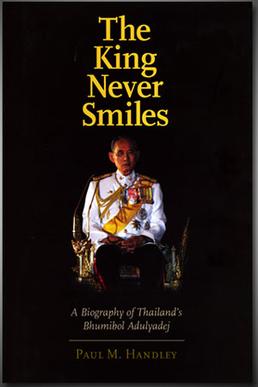
The King Never Smiles is an unauthorized biography of Thailand's King Bhumibol Adulyadej by Paul M. Handley, a freelance journalist who lived and worked as a foreign correspondent in Thailand. It is published by Yale University Press and was released in 2006. The book was banned in Thailand before publication, and the Thai authorities have blocked local access to websites advertising the book.

The Sixtieth Anniversary Celebrations of King Bhumibol Adulyadej's Accession to the Throne were the celebrations held throughout Thailand in 2006 to celebrate King Bhumibol Adulyadej's 60 years on the throne. The celebrations were arranged by the Royal Thai Government with Thaksin Shinawatra as Prime Minister, and joined by representatives of other monarchies.

The Palace Law of Succession, Buddhist Era 2467 (1924) governs succession to the Throne of the Kingdom of Thailand, under the ruling House of Chakri. Succession matters prior to the end of absolute monarchy in 1932 could be contentious, especially during the Ayutthaya period from the 14th to 18th centuries. In 1924, King Vajiravudh attempted to clarify the succession process by laying down the Palace Law of Succession. It was promulgated and came into effect in November 1924 as, in part, an attempt to eliminate the vagueness relating to succession within the Thai monarchical regime and to systematically resolve previous controversies. In 1932, after Siam became a constitutional monarchy, various amendments relating to succession were introduced. The 1997 Constitution of Thailand relied on the law with regards to succession, but the 2006 Interim Constitution made no mention of succession, leaving it to "constitutional practice". The 2007 Constitution again relied on the Palace Law. The preamble of the 2014 interim constitution of Thailand abrogated the 2007 Constitution, with the exception of chapter 2, concerning the monarchy and the succession.
An order, line or right of succession is the line of individuals necessitated to hold a high office when it becomes vacated, such as head of state or an honour such as a title of nobility. This sequence may be regulated through descent or by statute.

The royal flags of Thailand are personal royal flags that are usually flown in Thailand, along with the national flag, to honor the King and royal family. Unlike the royal standards displayed only in special ceremonies and in particular locations, the royal flags are seen throughout Thailand. They are not commonly seen outside the country.

The monarchy of Thailand refers to the constitutional monarchy of the Kingdom of Thailand. The king of Thailand is the head of state and head of the ruling Royal House of Chakri.
